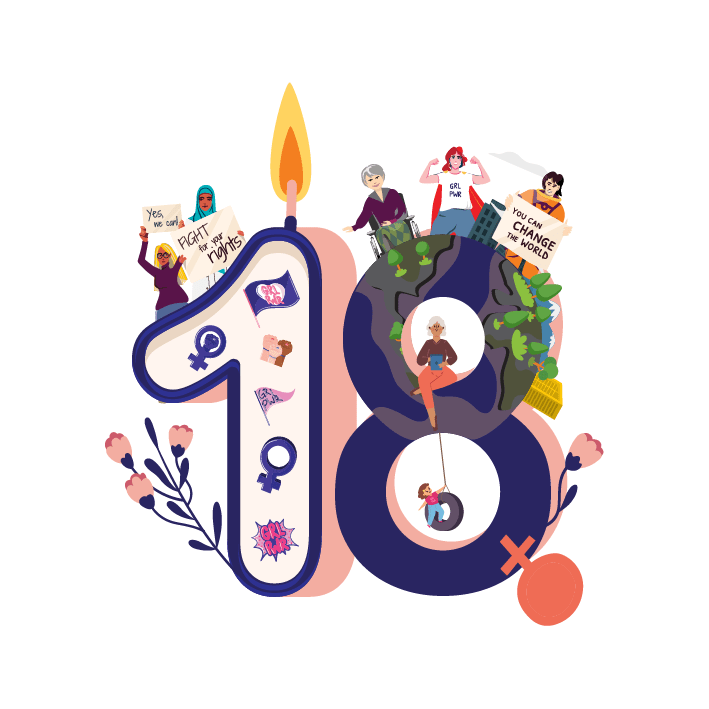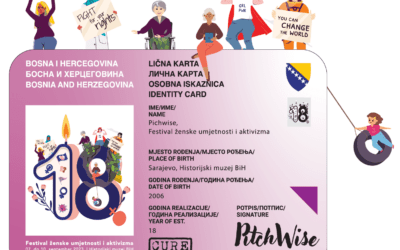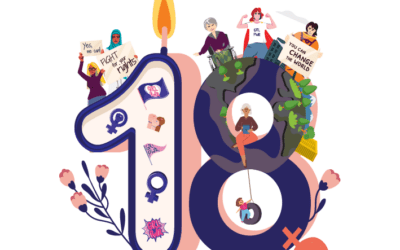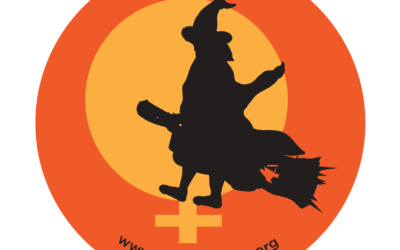Report about the 18th Festival of Women’s Art and Activism, 7th-10th September 2024 in Sarajevo, Bosnia and Herzegovina
Clara Lhullier

At the beginning of September 2023, the arrival of hundreds of feminists from former Yugoslavia in the center of Sarajevo marked the start of PitchWise Festival of Women’s Art and Activism. The first of its kind in Bosnia and Herzegovina, the festival was born when a group of activists from Fondacija CURE took the initiative to occupy abandoned and neglected public spaces. Since 2005, they turned into meeting places for socially engaged artists, activists, feminists and all others interested in women’s issues in BiH and the region. To celebrate its own coming of age, the 18th edition of PitchWise was entitled Girl Power will Overthrow the Patriarchy – We’ve been doing it for 18 years! and took place at the Historical Museum of Bosnia and Herzegovina as well as in the streets of Sarajevo.
As soon as I arrived on the festival’s first day, I was immediately struck by the long-lasting ties among frequent participants of PitchWise, from which many were activists from Serbia, Montenegro, Macedonia, Kosovo, Croatia and Slovenia who have been traveling to attend every annual edition. Surrounded by their enthusiasm during the festival days, I felt like I found a safe-haven where women of all ages, social backgrounds, and upbringings learned together, celebrated their sisterhood love and also found space for healing. They were local women from Sarajevo, migrant and refugee women, national minorities, survivors of war violence, LBT women, Roma women, women with disabilities, young girls… All in one place. If each of us spoke from our personal stories and positions, it was the differences among us that brought us closer to each other. Aware that we were differently affected by patriarchal structures, we built alliances to support one another and fight against every form of oppression which pushes us to the margins. We did not feel alone anymore: we were Sister Outsiders.
Since 2005, CURE has annually organized PitchWise according to pressing women’s issues in BiH and the region, with a particular focus on marginalized women who are excluded from dominant patriarchal narratives and victims of gender-based violence. This is when activists and artists showcase their work to explore, discuss and address a whole range of topics from a feminist perspective, from which many are still perceived with social stigma. Through workshops, panels, exhibitions, film screenings, performances, and music events, participants connect with each other but also with themselves by sharing opinions, stories and feelings. In 2023, PitchWise’s workshop topics ranged from pottery, dance, self-defense, gym workout, psychology and politics: together, we became aware of our bodies through physical activities and by working on our mental self-empowerment. Panels focused on gender-based violence against young women, women and girls in literature, as well as feminist festivals in Southeast Europe.
Having been to some regional festivals during the past years, I was particularly excited about the panel Sister Outsiders Topple the Patriarchy!. There, we discussed the role of festivals and grassroots organizations in dismantling patriarchal structures while raising awareness of women’s and LGBTIQ rights in BiH as well as in the former Yugoslavia. After attending the Red Dawns in Slovenia (born in 2001), and FemArt in Kosovo (born in 2012), it was my chance to hear more about PitchWise and other similar initiatives. During the event, Amina Imamović (Sarajevo Open Centre), Dženeta Agović (Impulse Tutin), Tihana Bertek (Vox Feminae), Tea Hvala (Mesto žensk, Rdeče zore, and Deuje babe), Jelena Višnjić (BeFem production) and Vedrana Frašto told us about how their activist work addresses local challenges and how we could collectively fight against the growth of anti-gender backlash in the region. By building spaces of play and joy but also of collective empowerment, festivals have preserved feminist alliances beyond borders and kept a transnational sense of belonging in the Balkans, which contested the divisive narratives from the wars of the late 1980s and 1990s.
Far from new, many of the festival organizers were already previously involved in anti-war initiatives during previous decades. In Bosnia and Herzegovina, this is particularly significant given the poor inclusion of women in the negotiations comprising the Dayton Peace Accords and in decision-making throughout the following decades of post-conflict reconstruction. To confront this, Bosnian women have addressed their under-representation in the political sphere by seeking alternative channels for fostering social change. As a result, they have been taking the forefront in leading peace-building work and promoting gender equality in their communities and the country. One of CURE’s founders, Jadranka Miličević, recounted how joining the feminist anti-militarist organization Women in Black Against War in 1992 to protest against the wars in Croatia and BiH was the starting point for her work with war survivors: “I did not want anyone to speak on my behalf and I did not want anyone to manipulate me. Despite the difficulties and problems I had during all these years, I tried to use my knowledge and experience to help those who needed help and support to survive and exercise their rights”. Also from CURE, Selma Hadžihalilović remembered her first time at the center for women victims of war rape, built amid the war: “There were some German women around, there were some Bosnian and Herzegovinian women around, women of different nationalities, of different social backgrounds, and they were all trying to do something. I was 17 at that time and that’s where I grew up, that is the place where I became a woman, that is a place where I learned what life is about, that’s a place where I learned what war is about.”
It was with this in mind that organizers from PitchWise envisioned the festival as a safe, intimate space where participants could share their personal lived experiences and post-war related trauma as a form of healing and agency. This also deconstructs the mainstream war legacy that treats women solely as victims: Rather, it highlights their efforts in speaking out as a source of support for others, but also of growing awareness about today’s patriarchal violence that remains present in BiH and the region. Beyond verbal communication, this is done so through different forms of artistic expression which become outlets for sharing feelings and nurturing collective feminist care during the festival. One example of this was last year’s documentary Miris kruva, which depicts stories of war, displacement and return through the narratives of three women from the Serbian national minority living in Croatia’s municipality of Biskupija.
In 2022, PitchWise also organized the panel “Fearless Heroines of Peace” to showcase the power of war survivors who endured different forms of torture and discrimination, later becoming agents of social change. In the panel one year later, Tena Sambolić Petrišić, Vendi Keserica, Jelena Memet, Selena Simić, Maja Šenk, and Medina Mujić gave an account of their views from Bosnia and Herzegovina, Serbia, Croatia, and Montenegro regarding gender-based violence, discussed possible ways to prevent it, its causes and consequences, and recommendations for protecting survivors. While agreeing that it stems from patriarchal structures and that it should be treated as a social issue, participants pointed out different shortcomings when it comes to addressing violence against women in the Balkans. In addition to the poor implementation of gender equality policies, the absence of these very policies and the overburdening of NGOs, activists were also concerned about the challenges girls and young women in the region face today. This topic was also touched upon during the play Devojčice, which portrays young girls’ encounters with patriarchal patterns through their coming of age as starting points for learning about personal-political boundaries.
During our free time, I walked around the streets of Sarajevo and found the same kindness from the participants of the festival in most of the locals I met. Looking around, it is hard not to be impressed by the mixture of mosques, orthodox and catholic churches, and one synagogue amid architectural styles that range from Austro-Hungarian empire times, brutalism from former Yugoslavia and the old bazaar of Baščaršija built in the 15th century during the Ottoman rule – all in one city. We also spent most of the days and evenings immersed in the Museum of Bosnia and Herzegovina, where PitchWise took place: we used the lunch and dinner breaks to exchange our impressions of the festival and get to know each other. During the evening concerts, we danced and sang through old Balkan songs that everyone seemed to know by heart.
If I felt like an outsider when walking to the venue on the festival’s first day, being surrounded by the feminist energy at PitchWise quickly made me feel at home. As Sister Outsiders, we were from different generations, countries, upbringings, religions, ethnical backgrounds, and sexualities, but we found a commonplace in each other. These long-lasting ties of friendship, care and love will bring me back to the 19th edition of the festival that takes place from the 12th until the 15th of September 2024. With the title Me, You, We* magnificent feminists: We can do it – start it – change it!, PitchWise will once again gather hundreds of women in the streets of Sarajevo. By transforming silence into action and not letting anyone else speak for us, we will keep challenging patriarchal oppressions that attempt to demobilize us: we have our own language, and we will speak together.


